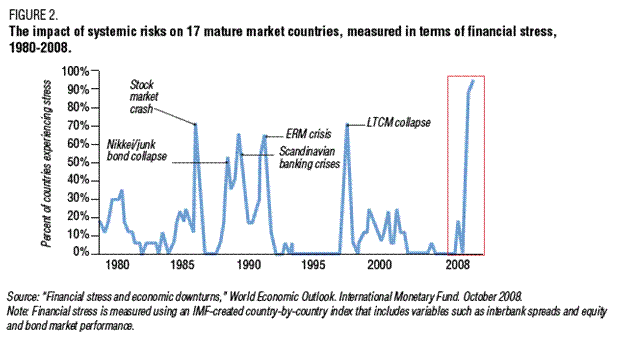
I received a few interesting reports recently and just got a chance to read some of them.
The first I got around to was from IBM's Institute for Business Value, with the grand title: “Toward transparency and sustainability: building a new financial order”.
There are various statistics and insights in the report which put the current crisis in perspective. For example:
“The number of banking crises and their magnitude have been gradually increasing. Between 1973 and 1997, there were 26 such crises, compared with just 15 in 1880-1913, 18 in 1919-1939 and 0 in 1945-1971.3 The crash that precipitated the Great Depression still remains the worst; between 1929 and 1933, the stock market fell 75 percent from its peak …
"The current crisis has already caused more financial stress than Black Monday; the collapse of the Nikkei; the Scandinavian banking crises in the early 1990s; the breakdown in the European Exchange Rate Mechanism (ERM) in 1992-1993; and the failure of U.S. hedge fund Long Term Capital Management.”
Maybe that’s why the industry’s market capitalization fell by 48% between April 2008 and January 2009!
I particularly liked this chart which you will no doubt see in my future presentations (double-click chart to see a large version:

The opening concludes with the line that, in 1992, the global average leverage ratio was just under 18:1. By 2007, it had climbed to 24:1. This is why Willem Buiter states that banks must deleverage lots!
The report then focuses upon a survey IBM performed between September 2008 and April 2009 of 2,700 financial professionals worldwide, including buy- and sell- side investment players, government and regulatory bodies, infrastructure providers, academics and more.
Results:
- 39% believe using technology effectively is critical to success but only 12% think their firm is doing this, a 27% gap;
- an even bigger gap of 29% exists between those who think their firms are effective at strategic alliances and those who think that this is important;
- 52% think that their managing systemic risk is key but only 21% think their firms are good at this, a 31% gap; and
- 43% think it is important to manage the risks associated with new products or markets, and only 18% think that their firms are proficient at this.
Then the figures that amazed me.
There is a 23% gap between understanding the needs of clients and the firm’s abilities to do this; an 18% gap in providing unbiased, high-quality advice; and a 26% gap in being able to manage client relationships effectively.
I’m amazed these firms get any business and even more amazed they keep the business of clients, particularly as over 60% of the institutional and retail investors and intermediaries surveyed believe that providers offer products that serve their own best interests, rather than those of their clients.
Even more disturbing is that many industry executives agree with them, with 79% of executives proving that they are completely disconnected from their clients.
What is this world coming to?
It also explains why specialist boutique firms have seen their revenues grow by 30% more than the universal banks, who offer retail and commercial banking as well as investment service.
The specialists also generate operating margins of 25% compared with 16% in the universal banks.
If you want a copy of the report, you can download a copy here.
Chris M Skinner
Chris Skinner is best known as an independent commentator on the financial markets through his blog, TheFinanser.com, as author of the bestselling book Digital Bank, and Chair of the European networking forum the Financial Services Club. He has been voted one of the most influential people in banking by The Financial Brand (as well as one of the best blogs), a FinTech Titan (Next Bank), one of the Fintech Leaders you need to follow (City AM, Deluxe and Jax Finance), as well as one of the Top 40 most influential people in financial technology by the Wall Street Journal's Financial News. To learn more click here...

